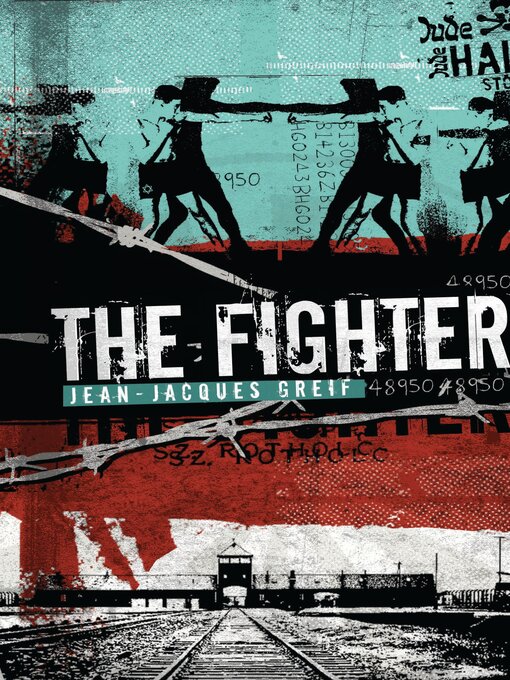Moshe wants to survive without killing his comrades, but how? Based on the memoir of his family friend, Jean-Jacques Greif has taken the facts and turned them into a gripping novel about life and death in Auschwitz.
-
Creators
-
Publisher
-
Release date
October 1, 2012 -
Formats
-
OverDrive Read
- ISBN: 9781619630734
-
EPUB ebook
- ISBN: 9781619630734
- File size: 2514 KB
-
-
Languages
- English
-
Levels
- ATOS Level: 4.6
- Lexile® Measure: 660
- Interest Level: 9-12(UG)
- Text Difficulty: 3
-
Reviews
-
Publisher's Weekly
September 4, 2006
French author Greif's moving and realistic novel follows Moshe Azik Wisniak, a Polish Jew, in a WWII concentration camp. Born in Praga, a suburb of Warsaw, Poland, in 1915, Moshe is no stranger to hatred against the Jews. At age 14, Moshe emigrates to Paris where he works for an uncle as a leatherworker. Moshe, who now goes by the name Maurice, marries and looks forward to a happy life in Paris until Hitler invades France. In 1941, Maurice and other Jews are rounded up; Maurice ends up in Auschwitz where every hour of every day is about survival. Greif (who also translated the novel into English) vividly depicts the horrific conditions in the camp and how taking off your shoes meant certain death. Maurice is lucky; he survives and is reunited with his wife and son. The atrocities he's experienced at the hands of the Germans, however, will remain with him forever. Greif's novel, based on the experience of an actual survivor, does not remove the audience from the horrors of the Holocaust; readers will be immersed in them right along with Moshe. Ages 12-up. -
School Library Journal
December 1, 2006
Gr 9 Up-Following his emigration from Warsaw to Paris in 1929, at age 14, Moshe adopts the French name Maurice. Within six years, he establishes a new life with a job, wife, and child in a city displaying less anti-Semitism than the city of his childhood. But his world is about to change again when the Nazis overtake Paris and he is deported, first to a work camp and then to Auschwitz. Moshe draws strength and emotional perseverance from his amateur-boxing hobby, using his skills and techniques to outsmart or even withstand the brutal beatings and long hours of hard labor with minimal nourishment. Told in first person, this novel is a day-by-day account, with graphically detailed descriptions of the cruelty and inhumanity created in a prison/slave environment with its own hierarchy pitting stronger Jews and other prisoners against weaker ones and overseen by merciless German commandos. Ultimately, the adage of survival of the fittest is clearly displayed here as Moshes story, based on a real survivors experience, is delineated, ironically negating Hitlers Final Solution. In the end, however, Greif reminds readers that one not only needed emotional and physical strength but also a whole lot of luck and cleverness to be able to resist and emerge from the torturous nightmare of the camps. Tough, realistic reading with some raw language."Rita Soltan, Youth Services Consultant, West Bloomfield, MI"Copyright 2006 School Library Journal, LLC Used with permission.
-
Booklist
October 1, 2006
Elie Wiesel in " Night "(1960" )," Primo Levi in " Survival in Auschwitz" (1960), and Anita Lobel in " No Pretty Pictures "(1998) wrote with unsparing truth about their experiences in the Nazi death camps, and their classic memoirs bear witness to both the horror and the humanity that gave them strength to go on. This novel, which includes many more gruesome particulars, may be too much for some readers. Must we know what it was really like to sift through the piles of corpses, and see eyes that have jumped out of their sockets? The son of an Auschwitz survivor, Greif grew up in France, hearing about cattle cars and poison gas before he heard fairy tales, and for this novel he draws on the experiences of his father's friend in the camps, a Polish Jew whom Greif calls Moshe Wisniak. Wisniak works in the gas chambers, and his present-tense narrative vividly describes the atrocities as well as the importance of courage, friendship, and, especially, luck in the fight for survival. A champion boxer, though small in stature, Wisniak is set up to entertain camp guards by fighting a dying prisoner. When the time comes to end the fight, however, the small boxer refuses to deliver the killing blow. In a note, Greif calls Wisniak a hero, a kind of Don Quixote figure, who fought back.(Reprinted with permission of Booklist, copyright 2006, American Library Association.) -
The Horn Book
January 1, 2007
In this unique juvenile Holocaust novel, the adult main character's present-tense, first-person narrative (based on a family friend's memoir) results in a sometimes unbearable immediacy. In 1942 Paris, Polish emigre Moshe, along with 3,500 other foreign Jews, is sent to Auschwitz. Greif emphasizes Moshe's humanity--his determination not only to survive but to survive on his own terms--in the face of unspeakable horrors.(Copyright 2007 by The Horn Book, Incorporated, Boston. All rights reserved.)
-
Formats
- OverDrive Read
- EPUB ebook
subjects
Languages
- English
Levels
- ATOS Level:4.6
- Lexile® Measure:660
- Interest Level:9-12(UG)
- Text Difficulty:3
Loading
Why is availability limited?
×Availability can change throughout the month based on the library's budget. You can still place a hold on the title, and your hold will be automatically filled as soon as the title is available again.
The Kindle Book format for this title is not supported on:
×Read-along ebook
×The OverDrive Read format of this ebook has professional narration that plays while you read in your browser. Learn more here.




